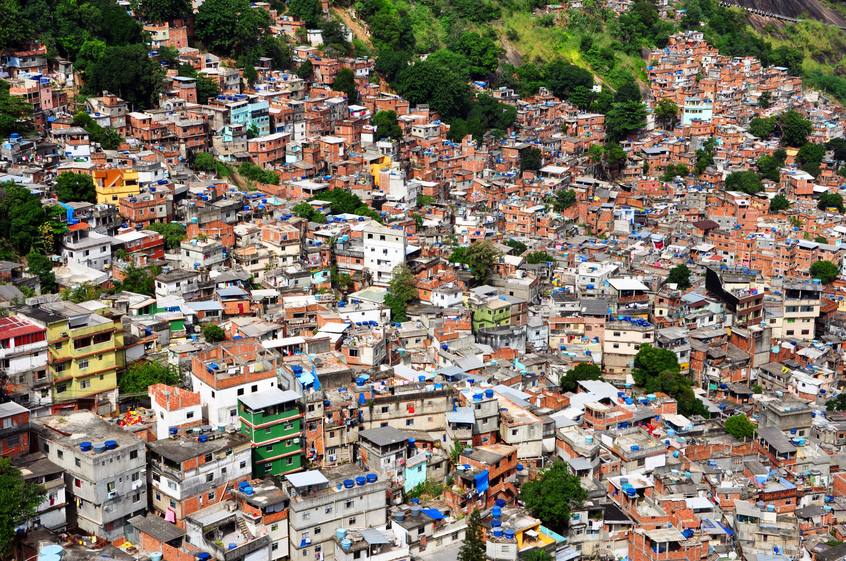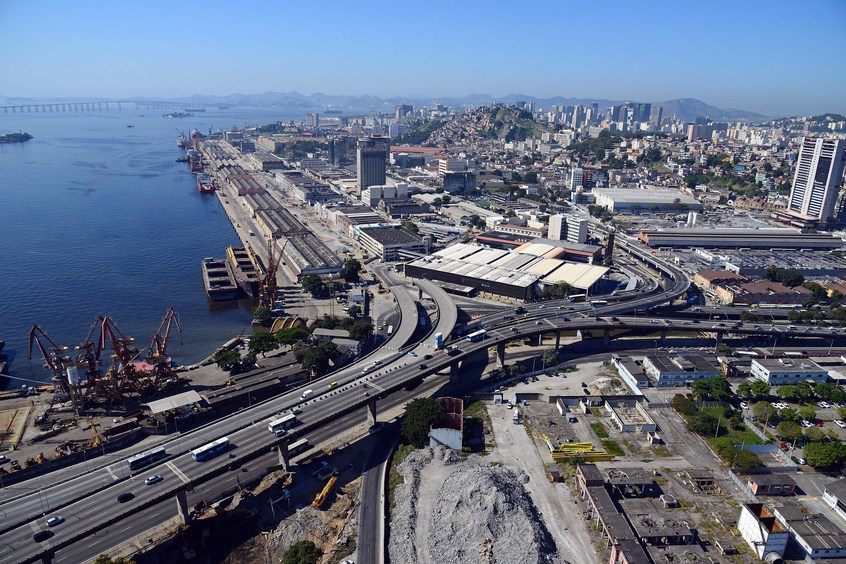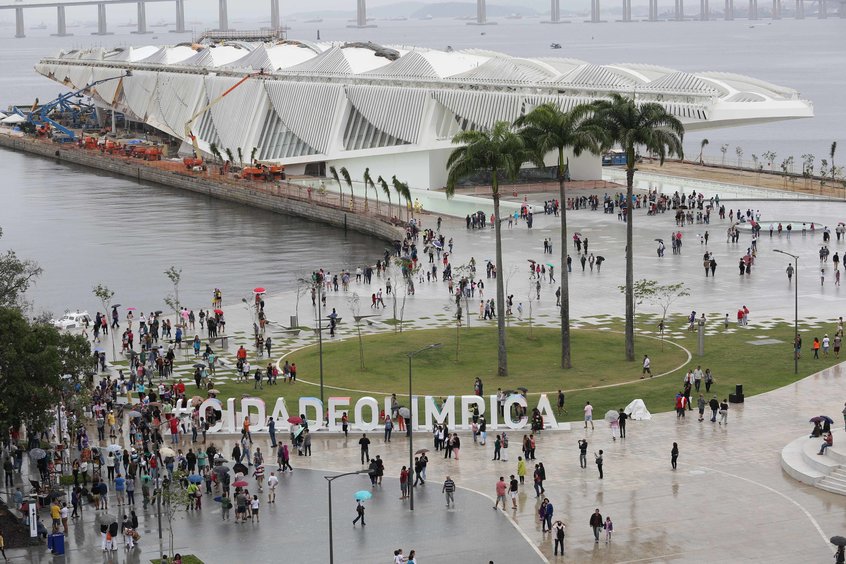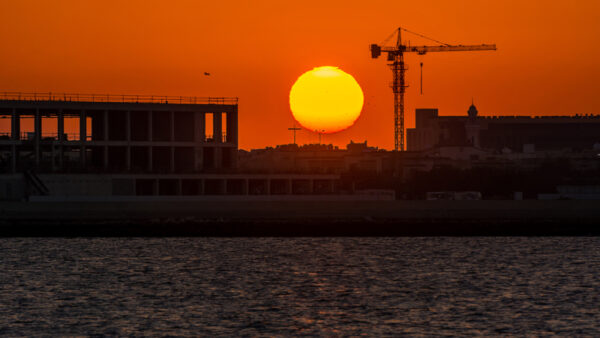When the Olympic torch arrived in Rio de Janeiro on 4th August it required a phalanx of riot police, shields locked, firing rubber bullets and tear gas, to punch their way through a crowd of protesters who were blocking the way. The torch represents peace, unity and friendship, the organisers of the Rio Games say on their website (emblazoned with the logos of Coca-Cola, Nissan and other sponsors), but three people, including a 10-year-old girl, were injured in the fray marking its entry to the city.
Days earlier, a group of teachers in Angra dos Rei in the south of the state of Rio de Janeiro, seized the torch and snuffed it out to protest their unpaid wages. They were not alone in their anger. A poll conducted three weeks before the Games suggested half the population opposed hosting them.
Brazil’s miseries are epic – corruption scandals, political upheavals, recession, the Zika virus – so there is plenty to be angry about. But if the Olympics are such a boon to a country, as their promoters insist they are, why are so many Brazilians angry about them? Have they not benefitted? Should they not be saying, “At least we have the Olympics to ease our burdens…”?
The mood in Brazil will fuel a growing body of opinion that says the Olympics are, in fact, bad. The idea is not just that some feckless governments get lured into putting on Games they can’t afford. Rather, it is that the very dynamics of the Olympics, and of other mega sporting events like the World Cup, hurt cities, especially the poor and ordinary people in them – including in London. In some countries, civil society can limit the damage, but in Rio, already riven by corruption, dysfunction, violence and harsh inequality, the dynamics found near perfect expression.
A prominent voice in this school of thought is Dr Christopher Gaffney, an urban geographer at the University of Zurich, who lived in Rio from 2009 to 2015 to study the impact of the 2014 World Cup, and who returned this year to do the same with the Olympics. He believes that mega sporting events encourage the wholesale transfer of assets and wealth from the public sphere to the private. They also fuel violence, criminalise poverty and provide a carte blanche for corruption.
These are not just unfortunate by-products, insists Gaffney. “All these are proven outcomes of nearly every mega event, and so they can’t be accidental, because the people organising them are not stupid,” he says. “They are the best-trained minds we have in marketing, in venue construction, in organisational theory. These are massive events that involve millions of people around the world. It’s a really complex thing that has really negative outcomes. And I believe that’s by design.
“It’s not the by-product, it’s the product. The by-product is that we feel good for a few weeks, and that’s it.”
Orchestrating it all is the International Olympics Committee (IOC), a members’ club headquartered in Switzerland whose ranks are swelled by sport-business bigwigs, many tainted by corruption probes, and minor royals from Europe and the Middle East. It bestows the right to stage the Olympics upon a city, and then rakes in billions by selling broadcasting rights, corporate sponsorship, tickets and licensing. At their own risk, the city must provide all venues and infrastructure to allow the Games to be held to the IOC’s exacting, media-friendly standards. Since bidding for the games is usually a contest among rivals, hopefuls outdo each other in their promises to the IOC and to their citizens (hence the ubiquitous buzzword, “legacy”), all while assuring citizens that it will be good value for money.

Rio organising committee President Carlos Arthur Nuzman, left, with International Olympics Committee President Thomas Bach, in Rio, 27 July 2016 (Fernando Frazão/Agência Brasil)
In the end, budgets are always broken, as are the promises. Beneficiaries pocket their cash, politicians enjoy the political capital, critics are labelled killjoys, and the show goes on.
What you don’t need
It’s Olympic bullshit – not a full lie, but it’s also not the full truth– Dr. Christopher Gaffney
In Rio, Gaffney applied the theory of this dynamic to two major “legacy” projects, an extension to Rio’s metro system, “Linha 4”, and the grand gentrification scheme of Porto Maravilha (“Marvellous Port”). His approach was simple: compare what the Rio organisers promised to do, and what they ended up doing after they won the bid in 2009, and map the effect. The results were depressingly familiar.
For the metro, originally, organisers promised to extend it to GaÌvea, which would have allowed the system eventually to link up with stations that were built in the 1970s but never opened. This would have been a boost to notoriously disconnected Rio, which Gaffney claims is the third most traffic-congested city in the world. But organisers dropped that promise after winning the bid, saying they would only extend the metro to Barra di Tijuca. This, Gaffney says, was great for the residents of that wealthy district, who would be able to nip downtown more easily, but the development of more necessary – and previously planned – lines that would benefit the city as a whole would now be off the agenda, perhaps for decades.
Brazil’s biggest construction firms benefitted, however. A consortium of Odebrecht, Queiroz Galvão and others was appointed to build the 16-km Linha 4. It was supposed to open in 2014, and to cost R$5.6 (US$1.7bn), but delays and spiralling costs ensued. In December 2015, Rio asked the federal government for an extra billion reais ($303m) to complete work in time for the Games. In February 2016 it was reported that Rio Mayor Eduardo Paes had warned the IOC that the line, considered vital to the smooth running of the Games, may not open in time, and that he had no idea why it was delayed.
It was finally inaugurated on 1 August 2016, four days before the opening ceremony. The final bill was reported as nearly double the original estimate, at R$9.7bn ($3bn), while the total amount owed by the government, taking into account the lifetime cost of loans, has been pegged at R$19bn ($5.9bn).
Big engineering projects often cross the finish line late and over budget, but they are especially prone under mania of mega events, says Gaffney: “The best way to increase prices is to tie major infrastructure to an event.”

Rocinha, Rio’s largest hill favela (chensiyuan/Wikimedia Commons)
Even before Linha 4 opened, federal police launched a bribery investigation that encompasses Odebrecht’s role on the metro scheme. Along with many others, the company’s reputation is in tatters. In March this year, Odebrecht’s former chief executive Marcelo Odebrecht was sentenced to 19 years in prison for his role in the Petrobras affair; former top officials of Queiroz Galvão have also been indicted.
Marvellous
In Linha 4, Gaffney sees the transfer of public cash, more than was planned, into the hands of contractors for an asset that doesn’t do what was promised or what the city really needs. At the same time, the state has run out of cash to fund basic services.
Even more predatory, in his view, is the ambitious real estate gambit in the city’s rundown Port and Centro districts, branded as Porto Maravilha. The grand plan is to gentrify 5 million square metres of urban territory, populated mostly by poor black and mixed-race people. Neglected for decades, and comprising about a third of Rio’s city footprint, the area had many disused, government-owned factories, warehouses and office buildings.
The Port region got barely a mention in Rio’s Olympics bid promises but, after Rio won, it became a fixation for the city’s movers and shakers. Within weeks Rio organisers asked if they could move several sporting venues and housing facilities there. The IOC refused. Undaunted, Rio Mayor Eduardo Paes declared the entire Port Region an Area of Special Social Interest, and other laws passed throughout 2009 and 2010 brought the entire district under city control. Organisers proceeded to make Porto Maravilha central to Rio 2016’s global marketing campaign.
What unfolded then Gaffney calls one of the largest privatisations ever seen in the Americas, a massive state offering on the altar of property speculation.
Encouraged by heavyweight construction firms Odebrecht and OAS, the city hatched a cunning financial plan to raise cash for the district. It invented units of development entitlement, called Certificates of Additional Construction Potential (abbreviated as “Cepacs” in Portuguese), and offered them up for auction. When developers didn’t rush in to buy, the Caixa Econômica Federal, a state bank, bought them all up for eight billion reais (R$8bn) – nearly US$5bn when the deal was done in 2011 – on behalf of a workers’ pension fund, the Severance Indemnity Fund for Employees, or FGTS in Portuguese.
Most of this R$8bn was then handed over to a new public-private consortium, called Porto Novo, a joint venture of Odebrecht, OAS and Carioca Christiani-Nielsen. Porto Novo’s job was to upgrade the district’s sewerage, roads, power and other infrastructure to prepare it for development, and to provide municipal services like waste collection. Its contract was for 15 years, to 2026.
Recouping the workers’ pension fund fell to the Caixa, which began trying to sell the Cepacs to developers who, tempted with tax breaks and other inducements, might build office buildings, hotels, and residential towers. The risk for the venture, Gaffney argues, is 100% public, while the gain (to developers) is 100% private. The workers, meanwhile, will just have have to wait and see if their pension fund is made whole.

Rio de Janeiro Mayor Eduardo Paes, in Rio, 27 July 2016 (Fernando Frazão/Agência Brasil)
Rio cast Porto Maravilha as a shining Olympics “legacy”. But for whom? It has been estimated that approximately ten thousand families lived there, paying low rents or squatting in buildings emptied between the 1960s and 1980s by various political and economic shifts, including the relocation of the country’s capital to Brasilia, the opening of a more functional port elsewhere on the bay, de-industrialisation, and middle-class fight to new suburbs. While the port development agency makes noises about these people being the “main beneficiary” of the grand plan, they are also in the way.
Most people consume the drug without personally experiencing the negative side effects, so it sells very well
By 2011 some five thousand families had already been evicted, according to Canadian academic Anne-Marie Broudehoux. In her paper published in The Routledge Companion to Urban Regeneration (2013), she notes that, before being evicted, many squatters had been in extensive negotiations with government over ownership, and had undertaken major repairs to the building stock.
A fragile process that could have helped ease Rio’s housing crisis had been in train. Broudehoux cites research indicating that, now, to make a profit, developers would need to sell a square metre of office or residential space for US$5,000 in 2011 prices, making Porto Maravilha the most expensive real estate in Rio. Original plans called for the construction of 20,000 affordable housing units, but that has since been slashed to just 500, pushed out to the periphery.
What’s in it for us?
The IOC is expected to bring in a total of $9.3bn in revenues from Rio 2016. It is a formidable business model, but it relies on the collusion of local kingpins, and their courtiers, who gain admission to the banquet of bribes, juicy contracts and development entitlements – the bill for which is footed by citizens.
Politicians may not be exposed as bribe-takers but they can always rely on reaping political capital: glory for having secured the games, plus a barn-full of IOUs from business and political elites. “The mayor of Los Angeles won’t be in office in 2024,” says Gaffney, of LA Mayor Eric Garcetti, one of a diminishing number of city leaders still chasing the Summer Games in eight years’ time. “He will have collected his political capital for bringing the games to LA, and then gone into higher office through that.”
The effects are more ravaging in some countries than others. “You also have corruption in London, Tokyo and Vancouver,” Gaffney says, “but it’s less aggravated because there you have stronger civil society mechanisms to keep on top of this. Stronger transparency pre-games will lead to greater transparency during the games preparation.” But wait. Even squeaky-clean London? Gaffney is afraid so. He points to hundreds of residents in Stratford evicted to make way for the Games, to promises on social housing consistently broken or watered down, plus the opening up of a “massive vector of real estate speculation”, and to the over-budget £701m Olympic Stadium, funded largely by taxpayers, being leased to the West Ham Premier League football club at terms so favourable as to be practically a gift. London 2012’s reputation for probity and thrift appeared to be sealed when, in 2013, the sports minister at the time revealed that the final bill for the Games had come in more than £500m less than the budget of £9.3bn.
The minister earned widespread ridicule, however, by failing to mention that the final bill, at £8.77bn, was nearly four times higher than the estimated cost – £2.4bn – that was waved in front of citizens when London won its bid in 2005.

A view of the port district affected by the Porto Maravilha plans, with the hilltop favela, Morro da Providência, in the background (Credit: PortoMaravilha.com)
Gaffney’s technical term for this is “Olympic bullshit”. London’s “accountability metrics” in relation to its Olympics promises are very low, he says. Those promises were used to turn public opinion. If that isn’t active corruption, it is passive corruption. “If not an outright lie, then it’s Olympic bullshit – not a full lie, but it’s also not the full truth.”
In Brazil, where civil society mechanisms were always weak, the costs of mega events are currently impossible to calculate. Rio Mayor Eduardo Paes is now doing everything possible to stop a parliamentary inquiry into Olympics spending, the anthropologist Luiz Eduardo Soares reports, although it is widely held that the Games’ proposed budget of $13bn was exceeded early on. What may never be calculated is the cost of lost opportunities: to build more functional infrastructure, and to ease tensions by providing housing and basic services. Gaffney maintains that the Olympics intensified Rio’s battle royale of competing interests – police, government, drug traffickers, milicias, property developers, ordinary people and global capital – in a way that made conflict metastasise into new territories. “This morning there was a massive gunfight in one of the favelas that sits between Ipanema and Copacabana,” Gaffney said when interviewed. “A forty-five minute shoot-out. That sort of thing is going to get worse before it gets better. That opportunity cost – we’ll only know how long it takes to recover in the next 50 years.”
No thank you
Other academics are lending scholarly weight to the anti-Olympics movement. Researchers at Said Business School, University of Oxford, calculate that from 1968 to 2016, every single Olympic Games ended up costing more than originally estimated. The average cost overrun is 156%. But among them are some whoppers, such as Montreal 1976, which overshot by 720% and bankrupted the city, Lake Placid 1980 (324%) and Sochi 2014 (289%, not counting the capital costs of general infrastructure).
They conclude: “for a city and nation to decide to stage the Olympic Games is to decide to take on one of the most costly and financially most risky type of megaproject that exists, something that many cities and nations have learned to their peril.”
But are the cost overruns somehow worth it? Not according to US academics Robert Baade and Victor Matheson, who came to the “overwhelming conclusion” this year that in most cases the Olympics are a money-losing proposition. Positive net benefits, they say, have come only under “very specific and unusual circumstances”. Cities appear to be catching on to this. Baade and Matheson note that the proportion of cities bidding for the Games in industrialised countries has fallen sharply since 2002. Filling in the gap have been cities from developing countries and Eastern European or former Soviet states.
So many cities are now saying “No thank you” to the Games that observers suggest the real threat to the IOC juggernaut is not doping scandals or corruption investigations but a lack of willing hosts. This played out dramatically in 2014 when Stockholm, Krakow, Munich, Davos, Barcelona and Quebec City all dropped out of the race for the 2022 Winter Olympics owing to a lack of popular support, in many cases after referenda were held.
Then, late in the contest, finalist Oslo caused much IOC consternation by withdrawing its bid amid negative public perceptions – not helped by the publication by a Norwegian newspaper of an imperious list of demands IOC officials made of the host city, including: to be received by the king before the opening ceremony; separate traffic lanes for all IOC members; a ceremonious runway welcome; specific room temperatures; late hotel bar openings; and various others concerning food and drink.
Down-to-earth Norwegians scoffed. Oslo’s departure left just two candidates, Almaty, Kazakhstan and Beijing, China, each the capital of an authoritarian state. Beijing won.
With the Summer 2024 Games next up for grabs, the IOC faces a similar situation. Boston, Hamburg, and Toronto have pulled out. Hungary’s Budapest is gearing up for a referendum on whether to carry on with its bid.
All eyes, meanwhile, have been on Rome.

The Museu do Amanhã (Museum of Tomorrow), designed by Santiago Calatrava, opened in December 2015 as the centrepiece of the Porto Maravilha regeneration scheme (Credit: PortoMaravilha.com)
Elected in June 2016, its new mayor Virginia Raggi, from Italy’s anti-establishment Five Star Movement (5SM), emphatically does not want to play. 5SM promotes sustainable development and anti-globalisation. “Already with 13 billion euros in debt, Rome can’t permit taking on more debt to make cathedrals in the desert,” Raggi said after her comfortable electoral success.
“Historical data from the Olympics — discounting eventual episodes of corruption — shows us that the costs are not sustainable,” she added. She has been scolded by Italy’s prime minister, Matteo Renzi, and Italy’s Rio medalists have begged her to change her mind but, so far, she is not bending.
Are the Olympics just evil, then? “It’s more like a vice, or a nationalist addiction that you know will make you feel good, but is ultimately destructive for hosts,” he says. “Of course, most people consume the drug without personally experiencing the negative side effects, so it sells very well. The business model is full of all of the contradictions of capitalism and ramps them up to an insane degree, making the world less equal, less sane, and more exclusionary.”
His advice to the people of Los Angeles? “The opposite of the Nike slogan,” he says. “Just don’t do it.”
Top image: Closing ceremony of the Olympic Games Rio 2016 (Fernando Frazão/Agência Brasil)
- This article is taken from a longer analysis to be published in the forthcoming edition of Construction Research & Innovation.
Visit here to find out more or order a copy.
Comments
Comments are closed.







Yes it is evil! Why?- because while pretending to aspire to the highest of human achievement it actually does the very opposite via the insane use of high performance doping it indirectly encourages! In addition it feeds an already sport addicted section of the world to ever higher levels of addiction approaching insanity and even violence at times! So it caters essentially to a special interest group and to a mind-blowing level of wholesale corruption all out of the pocket of the general tax paying world majority! This to such a devastating extent that most host nation’s economies have a very long struggle on the way to full recovery – if ever they will! No! they have to come up with another much less injurious way of flying that Olympic Flag!!!